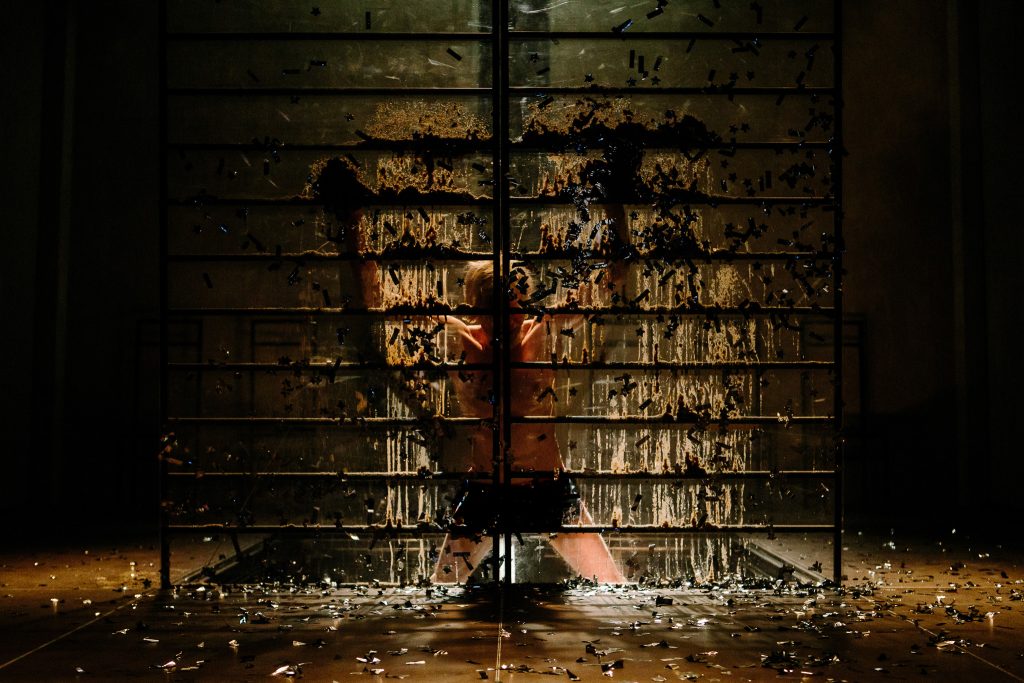Events
Teatr ProvisoriumThe Zero Point: The Kindly Ones
Janusz Opryński
CastEliza Borowska, Agata Góral, Jacek Brzeziński, Sławomir Grzymkowski, Artur Krajewski, Łukasz Lewandowski
Assistant to the directorŁukasz Lewandowski
Premiere5th February 2016
languagePolish with English surtitles
Janusz Opryński has tried the impossible – and won. The very act of referencing the Holocaust is brave and radical – for how can we talk about it today, when it seems that everything has been said already? How to talk about it from the perspective of the perpetrator? One cannot address the issue of violence lightheartedly – such a step cannot remain innocuous, always involving the risk of leaving deep traces on both actors and audiences. How to accept such responsibility? And finally – how to show something as “un-theatrical” as a 1000-page-long novel?
„Script of the performance “The Zero Point: The Kindly Ones” is based on fragments of the novel by Jonathan Littell, „The Kindly Ones,” and a few quotes from two Vasily Grossman’s novels “Life and Fate” and “Everything flows”.
We dare to tell the story of Max Aue, the story of a butcher, a German officer, the story of a member of an elite group called “masters of death”, which took an active part in the Holocaust of the Jews. It takes courage to tell the turbulent fate of an educated Europeans, who believed in the „meaning of his work.”
Jonathan Littell published the novel “The Kindly Ones” in August 2006. The book became a sensation among the readers, dividing the literary audience into two camps: those impressed by it and those who succumbed to the scandal. The character of Max provokes from the beginning, addressing the readers: “are you sure how would you act if you were in my place?”. Littell’s text is a great material for theatre, his extraordinary factual meticulousness, accuracy in describing events stimulates the imagination. It also has an unusual reference to the Greek tragedy, the “Oresteia.” History of Max and Una is the story of Orestes and Electra. It is also the story of a friend of our hero, Thomas, the Greek Pylades, who is, somewhat devilishly, speaking rather than remaining silent. The script of the performance was also inspired by two Vasiliy Grossman’s narratives, in order not to completely lose the perspective of the victim.
Courage is also necessary to attempt another time to “speak from the stage” about the Holocaust. How to speak? Does it make sense to go back to what is unimaginable? It is precisely the unimaginable that one need to be able to imagine – as Zygmunt Bauman reminds us in “The modernity and the Holocaust”.
We drew the first part of our title – The Point Zero – from Imre Kertesz’s reflection: “[…] In the end, Auschwitz did not happen in a void, but on the grounds of the Western culture and civilization […]. The fire killed everything that we so far recognized as European values, and in this ethical point zero, in these moral and spiritual darkness the only point from which we can all begin, is what caused this darkness: the Holocaust […]„. It is also Imre Kertész that we owe a certain kind of courage to try to tell the story.
And finally, we dared to see the perfect bureaucrats in the doings of Max and his friends who somehow resemble the modern corporation.”
Janusz Opryński
Music by
Rafał Rozmus
Stage design
Jerzy Rudzki
Costumes
Monika Nyckowska
Video
Aleksander Janas / kilku.com
Lights
Jan Piotr Szamryk
Sound
Jarosław Rudnicki
Stage technician
Adam Szadkowski
Stage manager
Marta Szczeblewska
Produced by
Barbara Sawicka
Production cooperation
Ewa Molik, Dorota Stochmalska, Piotr Pękala
Production:
Towarzystwo Edukacji Kulturalnej w Lublinie
Coproduced by:
Theatre Confrontations Festival, Centre for Culture in Lublin
The project funded by the Ministry of Culture and National Heritage
Sponsor of the performance
PKN ORLEN SA




